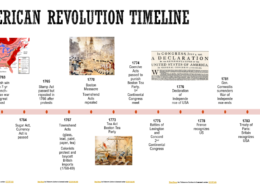American Civil War (1861–1865): This war was fought between the Northern and Southern states over slavery. Please give details in 200 words
Issues like taxation without representation and colonial grievances were significant contributors to the outbreak of the American Revolution: Taxation Without Representation: The British government imposed taxes on the colonies (e.g., Stamp Act, Townshend Acts) without providing them representationRead more
Issues like taxation without representation and colonial grievances were significant contributors to the outbreak of the American Revolution:
- Taxation Without Representation:
- The British government imposed taxes on the colonies (e.g., Stamp Act, Townshend Acts) without providing them representation in the British Parliament.
- Colonists believed this violated their rights as Englishmen, leading to widespread protest and the rallying cry, “No taxation without representation.”
- Economic Burdens:
- Various taxes and trade restrictions harmed colonial businesses and economies.
- Acts like the Navigation Acts and the Tea Act created economic hardships and resentment towards British control.
- Political Autonomy:
- Colonists desired more control over their own governance and resented British interference in colonial affairs.
- The dissolution of local legislatures and imposition of British-appointed governors fueled anger and demands for self-governance.
- Violent Clashes:
- Incidents like the Boston Massacre and confrontations at Lexington and Concord highlighted the escalating tensions and contributed to the willingness to take up arms against British forces.
- Intellectual Movement:
- Enlightenment ideas emphasized individual rights and questioned absolute authority, influencing colonial leaders and intellectuals.
- Writings and speeches by figures like Thomas Paine, John Adams, and Patrick Henry spread revolutionary ideas and mobilized public opinion.
- Punitive Measures:
- British responses to colonial protests, such as the Intolerable Acts, further united the colonies against perceived tyranny.
- These measures included closing Boston Harbor and revoking Massachusetts’ charter, seen as collective punishment for resistance.
Together, these issues created a sense of injustice and a desire for independence, ultimately leading to the American Revolution.
See less

The civil war by American from the year 1861 to 1865 between the Northern also called as Union and the Southern, called as Confederates primarily concerning slave, economics and sovereignty. There had been rising conflict for several decades because of different opinions on the issue of the spread oRead more
The civil war by American from the year 1861 to 1865 between the Northern also called as Union and the Southern, called as Confederates primarily concerning slave, economics and sovereignty. There had been rising conflict for several decades because of different opinions on the issue of the spread of slavery into new regions and its impact to the economy of the United States of America.
Civil War broke out on the 12th of April in 1861 through a successful attack on Fort Sumter in South Carolina. The North side was instituted by President Abraham Lincoln and its aim was to preserve the Union while in the long run eradicates slavery. The South was led by President Jefferson Davis and crossed their aim so as to enslave their nation so as to maintain their agricultural-based economy and slave culture.
Some of the major wars fought included the Battle of Gettysburg in 1863 where the tide was turned for the Union and of Sherman’s march to the sea in 1864 that destroyed much of Southern infrastructure. It came to the halt on April 9, 1865, Civil War’s officially recognized peace started when Confederate General Robert E. Lee surrendered to Union General Ulysses S. Grant at Appomattox Court House.
They determined that the Civil War was 620,000 deaths and immense devastation in the South; but it abolished slavery through the 13th Amendment and produced Reconstruction to dramatically alter the social fabric of America and the political culture of the country.
See less